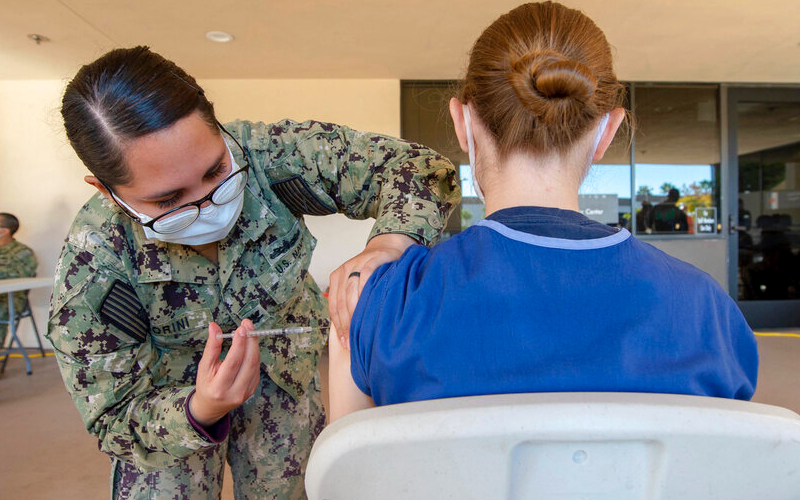Recovering from an illness such as COVID produces antibodies, which are made by the body’s immune system to fight the invading cells from a virus or bacteria. But many medical professionals are downplaying the role of antibodies while touting the vaccine, and they insist that area of expertise is still unknown 20 months after the first COVID case in the U.S. was first documented in a Washington state nursing home.
"I don't have a really firm answer for you on that,” Dr. Anthony Fauci, the chief medical advisor to President Biden, told CNN in August when he was finally asked by the media if natural immunity protects people more than the vaccine itself.
That non-answer came from a supposed medical expert, whose views are considered Gospel by much of the national media, and whose lack of an honest answer did not go unnoticed.
“Almost 20 months into the pandemic, it is shocking,” said U.S. Sen. Ron Johnson (R-WI), “that the chief medical advisor to the president does not have a firm grasp on the effectiveness of natural immunity, but still promotes freedom-robbing vaccine mandates. This administration clearly does not want the public to question whether natural immunity is more effective than vaccines.”
At the same time Dr. Fauci was claiming ignorance, a study of natural immunity in Israel concluded that patients who recover from the virus have “longer-lasting and stronger protection” against a second bout with the virus than vaccinated patients.
 That study was cited by fact-checking website Politifact after Florida’s governor, Ron DeSantis, stated at a mid-August press conference that people who have recovered from COVID-19 have “very strong” immunity. The governor cited the Israeli study in his speech, which Politifact was then forced to track down and review along with a second promising study on natural immunity from Rockefeller University.
That study was cited by fact-checking website Politifact after Florida’s governor, Ron DeSantis, stated at a mid-August press conference that people who have recovered from COVID-19 have “very strong” immunity. The governor cited the Israeli study in his speech, which Politifact was then forced to track down and review along with a second promising study on natural immunity from Rockefeller University.
Politifact then concluded:
Both vaccinations and natural exposure build memory B cells. But the Rockefeller team found that the memory B cells produced through natural infection are more robust. They continue to evolve over the months, while the vaccination-driven memory B cells stopped changing after about two months. When facing variants, the naturally occurring memory B cells delivered better protection.
Back in Israel, where the government led the world in vaccinating its citizens, the nation is witnessing the vaccine's virus-fighting effects wear off in fully vaccinated citizens who were vaccinated at the beginning of the year. Israel's surge in breakthrough cases over the summer was blamed on the elusive Delta variant.
Those eye-opening studies come at the same time the CDC has officially endorsed a third COVID shot when the calendar flips to six months after the second Pfizer shot or the first Johnson & Johnson shot.
Dr. Dawn Galbreath, a Texas-based internist and member of the Christian Medical Association, tells American Family News that science is often “gray,” and not always black or white, and that reality is found in the issue of natural immunity versus the vaccine.
“We know consistently,” she says, “that people maintain good immunity – strong levels of antibodies, high levels of antibodies – for up to 90 days after infection.”
Asked how long that immunity lasts, Galbreath says that question is not easily answered “because it varies a lot more from person to person than the vaccine community.”
Regarding the vaccine itself, Dr. Galbreath acknowledges there is controversy over its hurried introduction to the public.

“However, that is a lot of people who’s gotten that vaccine in that 14-month period of time,” she says. “And we have an incredibly small, adverse event rate.”
Meanwhile, President Biden publicly received a third Pfizer jab Monday at the White House, where he repeated his now-familiar criticism of fellow Americans who have not been vaccinated.
“How many Americans need to be vaccinated before getting back to normal?” a reporter asked. “What is the percentage of total vaccinations?”
“I think we get the vast majority, like is going on in some of these industries and some schools: 97, 98 percent. I think we're getting awful close,” Biden replied. “But I’m not the scientist but I think one thing is for certain: a quarter of the country can’t go unvaccinated and us not continue to have a problem.”
Meanwhile, at the same time it is becoming more likely that “fully vaccinated” will mean getting a third shot, the CDC's current definition means 183.6 million American are fully vaccinated. That figure accounts for 83.5% of Americans 65 and older and 55% of the country overall.







